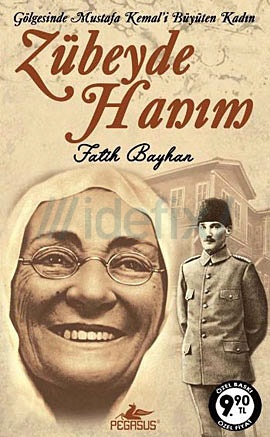Το άρθρο της ημέρας, που ξεσηκώνει ήδη τεράστιες
αντιδράσεις στους εθνικιστικούς κύκλους της Τουρκίας
και σε λίγο και τους Τουρκολάγνους της Ελλάδας,
δημοσιεύεται στη Zaman.
Ο Orhan Kemal Cengiz, αναφέρεται σε ένα βιβλίο του
Fatih Bayhan, που θα κυκλοφορήσει σε λίγες
μέρες και στο οποίο ανατρέπονται όσα ξέραμε μέχρι
σήμερα, ότι δηλαδή ο Κεμάλ ήταν Εβραίος που
εξισλαμίστηκε, γεννήθηκε στη Χρυσαυγή Λαγκαδά,
ήρθε στη Θεσσαλονίκη σε ηλικία έξη ετών και έφυγε
για τις σπουδές του σε ηλικία 18 ετών.
Ο Bayhan γράφει -και υπόσχεται να παρουσιάσει τα ντοκουμέντα- ότι ..
ο Κεμάλ, ήταν Αρμένιος.
Οι πραγματικοί του γονείς ζούσαν στη Μαλάττεια, όπου διέμεναν
πολλοί Αρμένιοι και μετανάστευσαν στη Θεσσαλονίκη, χωρίς τον μικρό
Κεμάλ. Η Zübeyde Hanım που όλοι γνωρίζουμε ως μητέρα του, ήταν στην
πραγματικότητα θεία του.
Ο Κεμάλ έφτασε από τη Μαλάττεια στη Θεσσαλονίκη, όταν ο πραγματικός
πατέρας του πέθανε. Λίγο αργότερα πέθανε και η μητέρα του Ayse και τον
υιοθέτησε η Zübeyde Hanım, που έμεινε γνωστή ως μητέρα του.
Ο συγγραφέας ερεύνησε τα οθωμανικά αρχεία από όπου πήρε επίσημα έγγραφα
για την καταγωγή του Κεμάλ. Βάσει των στοιχείων που έχει στη διάθεση του
ο συγγραφέας, ο Κεμάλ γεννήθηκε στο Akcadag της πόλης Μαλάτια (Μελιτινή).
Το επώνυμο της οικογένειας ήταν Cakirogullari. Πατέρας του Κεμάλ ήταν ο
Mehmet Resat Bey, γνωστός με το ψευδώνυμο Mamo. Το όνομα της μητέρας
του ήταν Ayse. O πατέρας ήταν μέλος της Teskilat-I Mahsusa, της μυστικής
υπηρεσίας που αργότερα ονομάστηκε ΜΙΤ. Τα στοιχεία αυτά ανατρέπουν
όλα όσα γνωρίζαμε μέχρι τώρα για την οικογένεια του.
Was Atatürk an Armenian?
 |
| O συγγραφέας του βιβλίου Fatih Bayan |
origins of Mustafa Kemal Atatürk, the founder of the Turkish Republic.
Radikal reported, according to the forthcoming book “From Mustafa to
Kemal: Atatürk’s Big Secret” by Fatih Bayhan, that the family origins of
Atatürk do not lie in Thessaloniki, as is commonly believed, but instead in the
eastern province of Malatya. Bayhan claims that Atatürk’s family immigrated to
Thessaloniki from Malatya.
According to this new version of his life, Atatürk’s true father and mother were
people who lived in Malatya and Atatürk’s acknowledged mother, Zübeyde
Hanım, was actually his aunt. The writer claims that Atatürk was sent to
Thessaloniki when his actual father died and was adopted by Zübeyde
Hanım when his mother died. The book is said to be based on official
governmental records and documents that are set to be made public for
the first time.
I do not want to bother you with all these details any more. This allegation of
course needs to be proven. However, I would not be surprised if it turns out
to be true. Much of history in Turkey is based on so many lies and legends,
all of which were created to deny some fundamental facts in our past.
Turkish official history “writers” never hesitated to bend history according
to the needs of our official ideology and the state’s so-called “higher interests.”
Malatya was one of the provinces which were heavily populated by Armenians
in the past. If this new version of Atatürk’s origins is true, the first question to
come to mind is why the history writers fabricated the well-known version of his
life. Did they write the official version to disassociate Atatürk from Anatolian
Armenians? If the new story is true, there must be a reason.
The facts of Turkish history are still surrounded by many taboos, some of which
have caused loss of life. You know how the tragic events leading to the
assassination of Hrant Dink began. He simply dared to say that Atatürk’s
adopted daughter Sabiha Gökçen was indeed an Armenian orphan. And
this revelation was followed a lynching campaign and he was killed after that.
Nowadays the walls around the taboos which surround our history seem to be
weakening. Ayhan Aktar keeps writing about some taboos in our history. One
of the stories he tells is about the Dardanelles wars. According to Aktar, one of
the heroes of this war was Cpt. Sarkis Torosyan, a citizen of Armenian descent
in the Ottoman Empire. Torosyan’s story is a heartbreaking one. Torosyan
was a much-decorated gunner wounded while defending the Dardanelles.
He was later transferred to the area where his family had been deported,
modern-day Palestine. There he discovered his sister in rags and heard his
fiancée was dying of tuberculosis. He learned that his parents had been killed
along the way. While he was defending his country to the death, his family and
loved ones had been forcefully evicted from their homes.
This story is of course not written in any schoolbooks, nor is it known by many
people in Turkey. Some may think this story is just a tiny detail in Turkish history,
but I think it’s a very significant and important one. The real story of an Armenian
captain who fought a heroic war in the Dardanelles is a huge burden on the
Turkish conscience. This is because this one single event has the capacity to
bring up all of our painful memories about our long-lost neighbors and about
our past.
As I repeatedly said in this column before, people confront their past by opening
their hearts to the stories of others, by feeling the pain and anguish they
suffered -- a process which has already started in Turkey and in which we
have a very long way to go.΄





Δεν υπάρχουν σχόλια:
Δημοσίευση σχολίου
Παρακαλούνται οι φίλοι που καταθέτουν τις απόψεις τους να χρησιμοποιούν ψευδώνυμο για να διευκολύνεται ο διάλογος. Μηνύματα τα οποία προσβάλλουν τον συγγραφέα του άρθρου, υβριστικά μηνύματα ή μηνύματα εκτός θέματος θα διαγράφονται. Προτιμήστε την ελληνική γλώσσα αντί για greeklish.